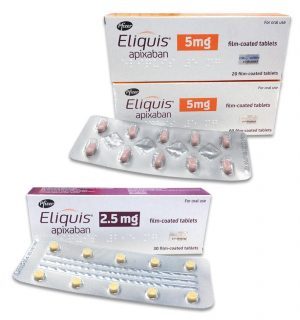- Home
- Editorial
- News
- Practice Guidelines
- Anesthesiology Guidelines
- Cancer Guidelines
- Cardiac Sciences Guidelines
- Critical Care Guidelines
- Dentistry Guidelines
- Dermatology Guidelines
- Diabetes and Endo Guidelines
- Diagnostics Guidelines
- ENT Guidelines
- Featured Practice Guidelines
- Gastroenterology Guidelines
- Geriatrics Guidelines
- Medicine Guidelines
- Nephrology Guidelines
- Neurosciences Guidelines
- Obs and Gynae Guidelines
- Ophthalmology Guidelines
- Orthopaedics Guidelines
- Paediatrics Guidelines
- Psychiatry Guidelines
- Pulmonology Guidelines
- Radiology Guidelines
- Surgery Guidelines
- Urology Guidelines
Apixaban as safe as warfarin during catheter ablation of AF

Nearly one-third of all strokes are caused by atrial fibrillation and Oral anticoagulation is a necessity for stroke prevention in patients with atrial fibrillation. Catheter ablation is used in patients with atrial fibrillation to restore and maintain the heart’s normal rhythm and ESC guidelines recommend that atrial fibrillation ablation should be performed with continuous anticoagulation. According to results of the AXAFA-AFNET 5 trial presented at EHRA 2018, a European Society of Cardiology (ESC) congress, it has been found that Apixaban and warfarin are equally safe during catheter ablation of atrial fibrillation, There were similar rates of stroke and bleeding, and an improvement in cognitive function was shown for the first time.The results of this study confirm that the NOAC apixaban is as safe as a VKA in this situation.
The AXAFA-AFNET 5 trial was the first randomized trial to examine whether continuous apixaban was a safe alternative to a VKA during catheter ablation of atrial fibrillation.3 The study design has been previously reported.Briefly, 633 patients with atrial fibrillation and additional stroke risk factors scheduled to undergo atrial fibrillation ablation in Europe and the US were randomised to receive either continuous apixaban or the locally used VKA (warfarin, phenprocoumon, acenocoumarol, or fluindione).
The primary outcome was a composite of all-cause death, stroke, and major bleeding up to three months after ablation. It occurred in 22 patients randomised to apixaban and 23 randomised to VKA. Professor Paulus Kirchhof, international chief investigator of the trial, said: “The results show that apixaban is a safe alternative to warfarin during catheter ablation of atrial fibrillation in patients at risk of stroke.”
The researchers assessed cognitive function at the beginning and end of the trial and found that it improved equally in both treatment groups. Professor Kirchhof said: “This is the first randomised trial to show that cognitive function is improving after atrial fibrillation ablation. It is possible that this is due to continuous anticoagulation, although we did not test this specifically.” A magnetic resonance imaging sub-study in 335 patients showed a similar rate of silent strokes in the apixaban (27%) and VKA (25%) groups.
The researchers concluded that continuous apixaban is safe and effective in patients undergoing atrial fibrillation ablation at risk of stroke with respect to bleeding, stroke, and cognitive function. Further research is needed to reduce ablation-related acute brain lesions.
For further reference log on to : https://doi.org/10.1093/eurheartj/ehy176

Disclaimer: This site is primarily intended for healthcare professionals. Any content/information on this website does not replace the advice of medical and/or health professionals and should not be construed as medical/diagnostic advice/endorsement or prescription. Use of this site is subject to our terms of use, privacy policy, advertisement policy. © 2020 Minerva Medical Treatment Pvt Ltd